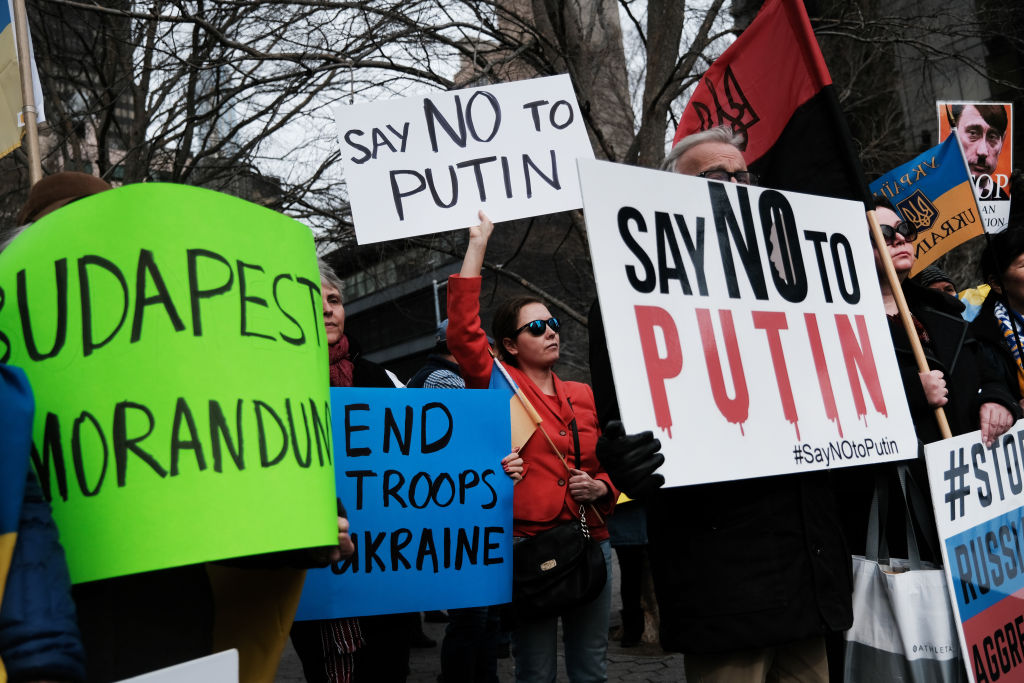The Ukraine Crisis Continues To Make People Go Insane
1:41 PM EST on February 18, 2022

Defector has partnered with Discourse Blog to bring you a taste of their work. They write good shit that we think you’ll like—and they’re offering Defector readers 25% off all annual subscriptions. Click here to get yours.
This piece was originally published on Discourse Blog on Feb. 16, 2022.
KYIV—It’s natural to get a bit mad at the prospect of a catastrophic war. A couple nights ago, I woke up to go pee at my AirBnB in Kyiv, Ukraine, and discovered that the flat had no running water, which made me think for about half a second that this was it, the Russians were coming, they’d shut down the water and power and bombs were on their way. Then I went back to bed. In the morning we found out that it was a burst pipe and that they’d shut down water overnight to work on it, assumedly so people wouldn’t be inconvenienced during the day.
I’m pretty confident that most people in Kyiv have had strange, absurd thoughts like this over the last several weeks. This is natural when Western intelligence agencies have been screaming about the threat of an imminent invasion for months, and also when the Russian government has parked 150,000 soldiers on three sides of your country. Is an invasion possible? Absolutely. Is it probable? Honestly, who knows? But you’d have to be extremely gullible to believe it’s as ensured as the Biden administration says it is. Ukrainians I’ve spoken to say that this fever swamp of rhetoric is both incredibly stressful and incredibly annoying, to the extent that some of them now actively avoid the news.
What’s funny, however, is that this situation has caused the most relative insanity in people who face zero risk from the potential conflict and are experiencing it entirely online, perfectly incubated in the politically charged and virtue-signaling primordial soup of discourse that accompanies almost any major foreign policy event—particularly those involving Russia. And that means we’re getting some takes.
Let’s lead with the best, shall we? Here’s the Atlantic Council’s Melinda Haring a few days ago, on an absolute tear seemingly based entirely on National Security Advisor Jake Sullivan’s remarks at a press briefing.
Putin has big weekend plans in Ukraine: 1) he's going to cut power and heat, knock out Ukrainian navy and air force, kill general staff and hit them with cyber attack; 2) then install pro-Russian president and 3) resort to full-scale military invasion if Ukraine doesn't give in
— Melinda Haring (@melindaharing) February 11, 2022
I don’t really know where you go from that. Haring is clearly extrapolating a worst-of-worst-cases scenario and combining a whole number of things that are individually technically possible (while extremely unlikely) into some brain fever of imminent panic. Also, this person lives in D.C.
Same author, pre-weekend and post-weekend. pic.twitter.com/lDM1zY2nTx
— Joshua Yaffa (@yaffaesque) February 15, 2022
This kind of overt paranoia has spilled into the mainstream press as well, which has not seen fit to temper the U.S.’s messaging with any sort of sober analysis, and is instead extrapolating wildly, leading us to articles like this, from the Associated Press:
President Joe Biden has said he will not fight Russia in Ukraine, nor would America’s NATO allies. So a Russian invasion would not automatically trigger a wider war. But if Putin took his offensive beyond Ukraine’s borders onto NATO territory, the United States could get drawn into it. That’s because Washington is obliged by the North Atlantic Treaty to defend its allies, some of whom fear they are Russian targets.
[…]
Beyond the seemingly unlikely scenario of Putin deliberately extending an invasion beyond Ukraine, there is a risk that even a limited war could spread as a result of an accident, a miscalculation or a misunderstanding. Once the fighting started, a bit of bad luck could lead to more conflict.
AP’s analysis, to be fair, hedges more than what we’re leading into. It notes that Putin “extending an invasion” beyond the borders of Ukraine is “unlikely,” which is a massive understatement, but sure, we’ll take it.
Even then, the entire premise of this piece assumes that a full-scale invasion of Ukraine is a likely scenario at this point. It’s not! It’s definitely possible—but an invasion on the scale that AP and many outlets are using as their starting point for many of these thought experiments is perhaps the worst-case scenario in a long list of other ways a conflict could play out, even if Russia resorts to violence.
(There’s an aside here where I split hairs over the fact that the take that the U.S. is “warmongering” in Ukraine is also dumb, as the Biden administration has been explicitly clear that it will not commit troops to a conflict in Ukraine, and that there’s plenty to criticize in its aggressive, high-stakes messaging strategy without claiming it’s a cover for further U.S. involvement, but you know what we don’t need to get that far into it.)
The endpoint of that is shit like this, in which CBS News national security correspondent David Martin spins up a Risk board nonsense scenario in which Russia steamrollers through Ukraine and plows straight into Moldova.
This is absurd! This is not something we need to discuss right now! U.S. strategy thus far has—wisely, in my opinion—been structured around preventing NATO elements from coming into any contact with the Russian military if the latter does decide to pursue an invasion of Ukraine. Sure, Biden has put new detachments of troops in some Baltic states and NATO allies recently, but you have to be a complete lunatic (or utterly desperate to fill cable airtime) to assert that Vladimir Putin would be dumb enough to just plow on through Ukraine and keep going.
This is cable news war brain, and it has almost zero connection with reality, despite what the worst elements of the Atlantic Council want you to think.
Anyway. Let’s get back to the fun stuff and close with this, which is a brilliant and perfect British tabloid essay.

10/10, no notes. God bless you, former ITV host and Sun columnist Jane Moore. Never change.
Everyone else, calm down.
If you liked this blog, please share it! Your referrals help Defector reach new readers, and those new readers always get a few free blogs before encountering our paywall.
Read More:
Stay in touch
Sign up for our free newsletter




